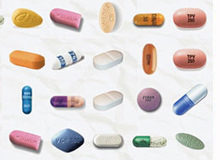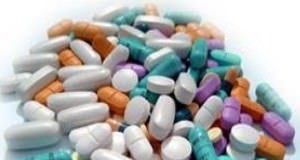Nearly 7 in 10 Americans Are On Prescription Drugs
Nearly 70 percent of Americans are on at least one prescription drug, and more than half take two, Mayo Clinic researchers say. Antibiotics, antidepressants...
Triple Mix Of Blood Pressure Drugs And Painkillers Linked To Kidney...
Patients who take a triple combination of blood pressure drugs and common painkillers are at an increased risk of serious kidney problems, especially at the start of treatment, finds a new study published on the British Medical Journal website.
Drug Expiration Dates – Do They Mean Anything?
With a splitting headache you reach into your medicine cabinet for some aspirin only to find the stamped expiration date on the bottle has passed - two years ago. So, do you take it or don't you? If you decide to take the aspirin will it be a fatal mistake or will you simply continue to suffer from the headache?
Medication Expiration Dates Cheat Consumers: Lawsuit
Have you ever tossed an expensive bottle of prescription or over-the-counter drugs because they had “expired”? A class action lawsuit claims these dates are basically bogus, made up to goose replacement sales by drug makers who know the drugs are good for years, even decades, after the “use by” date.
Common Medications Shown to Impair Memory, Cognitive Performance in Elderly
Are you elderly and having memory or concentration problems? They might be caused by common medications used to treat insomnia, anxiety, itching or allergies,...
Statins Are Unlikely To Prevent Blood Clots, Large Analysis Finds
Despite previous studies suggesting the contrary, statins (cholesterol-lowering drugs) may not prevent blood clots (venous thrombo-embolism) in adults, according to a large analysis by international researchers published in this week's PLOS Medicine.
Antidepressants, Sleeping Pills And Anxiety Drugs May Increase Driving Risk
Drugs prescribed to treat anxiety, depression and insomnia may increase patients' risk of being involved in motor vehicle accidents, according to a recent study, published in the British Journal of Clinical Pharmacology. Based on the findings, the researchers suggested doctors should consider advising patients not to drive while taking these drugs.
Popular Pain-Relieving Medicines Linked To Hearing Loss In Women
Headache? Back pain? At the first sign of pain, you might reach for a pain-relieving medicine to sooth your bodily woes. Analgesics are the most frequently used medications in the United States and are commonly used to treat a variety of medical conditions.
Cannabis Anti-Convulsant Shakes Up Epilepsy Treatment
The versatile cannabis plant may have a new use: it could be used to control epileptic seizures with fewer side effects than currently prescribed anti-convulsants. Ben Whalley at the University of Reading, UK, and colleagues worked with GW Pharmaceuticals in Wiltshire, UK, to investigate the anti-convulsant properties of cannabidivarin (CBDV), a little-studied chemical found in cannabis and some other plants.
Diagnostic ‘Fatal Flaws’ In The ICU May Account For As Many...
Each year as many as 40,500 critically ill U.S. hospital patients die with an unknown medical condition that may have caused or contributed to their death, Johns Hopkins patient safety experts report in a recent study. In a discussion of their findings, described online in BMJ Quality & Safety, researchers say that although diagnostic errors in the intensive care unit (ICU) may claim as many lives each year as breast cancer, they remain an underappreciated cause of preventable patient harm.
Cholesterol-Lowering Drugs May Be Linked To Increased Cataract Risk
Patients using cholesterol-lowering statin drugs may be at increased risk of developing age-related cataracts, according to a study -- "Age-related Cataract Is Associated with Type 2 Diabetes and Statin Use," in the August issue of Optometry and Vision Science, official journal of the American Academy of Optometry.
Corticosteroids Not Effective For Treating Acute Sinusitis, Study Suggests
Corticosteroids, frequently prescribed to alleviate acute sinusitis, show no clinical benefit in treating the condition, according to a randomized controlled trial published in CMAJ (Canadian Medical Association Journal).
















